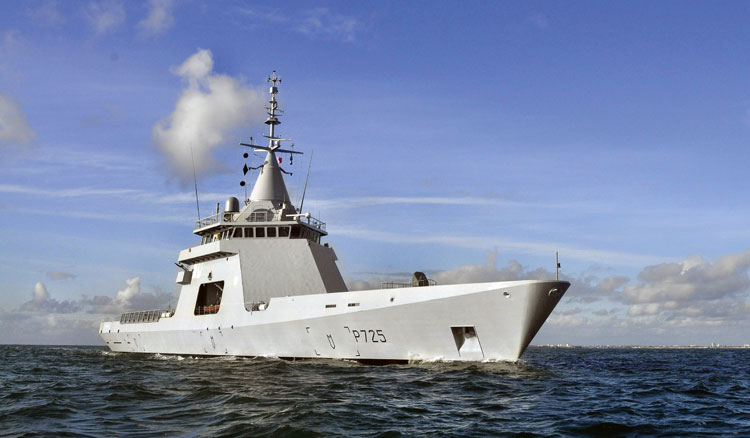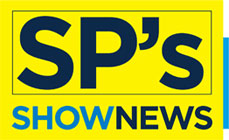- Prime Minister Narendra Modi inaugurates Aero India 2023 in Bengaluru; Releases Commemorative Stamp
- Defence Secretary meets delegations from Saudi Arabia, USA and Oman on the sidelines of Aero India 2023
- Foreign Ministers of 32 countries to attend Aero India 2023
- Embraer showcases the C-390 Millennium at Aero India 2023
‘We are excited to be a part of Defexpo India 2012 and keen to showcase our expertise in naval defence’
Bernard Buisson, Managing Director, DCNS India

SP’s ShowNews (SP’s): What are the key highlights for DCNS at Defexpo India 2012?
Bernard Buisson (Buisson): DCNS is to showcase a wide range of expertise at Defexpo India 2012. We will be displaying the Indian P75 Scorpene submarine together with its SUBTICS combat system and its optional MESMA air independent propulsion section.
- The Mistral-Class LHD (199 metres, 21,500 tonnes), the Gowind OPV L’Adroit (87 metres, 1,000 tonnes) together with the Barracuda SSN and a future aircraft carrier design will also be displayed.
- On a wider note, DCNS is aiming at providing ‘solutions’. We work through partnerships to adapt our solutions to the customers’ needs. That is to say, we do not only design a product but a comprehensive industrial package. As per our recent contracts, we provide custom-made designs, transfers of technology (ToT) and of know-how, industrial partnerships and trainings (from a range a vessels to their naval base).
SP’s: There will be a lot of interest and excitement for India P75 Scorpene submarines at Defexpo. What is the current status of the Scorpene programme?
Buisson: The hulls of the five first submarines are completed. The sixth hull shall be completed by the year end.
A few weeks ago, DCNS India has delivered Mazagon Dock Limited (MDL) the first locally produced Scorpene submarines equipment. We are at the stage of outfitting where equipment are being integrated inside the hulls’ sections for submarines 1 & 2. For the upcoming stages of the building (outfittings together with systems’ integration and running of trials), an adapted organisation from the shipyard is needed. Together with MDL, we created a common ‘task force’ aiming at quality and greatest efficiency.
The first Scorpene submarine is to be launched by the end of 2013 and commissioned in 2015. The sixth Scorpene is expected to be commissioned in 2018.

SP’s: Who are the Indian partners with whom DCNS is currently working with?
Buisson: DCNS is continuously striving to go beyond the contractual ToT with MDL so that vital equipment could be locally manufactured. The aim is to enhance local expertises with the Indian industries.
DCNS India is in the process of finalising the selection of the industrial partners for the indigenisation of the Mazagon Purchase Materials (MPM). We have been successfully delivering the first equipment with Flash Forge a few weeks back.
Recently, DCNS India signed a contract with SEC Industries for the manufacture of further P75 items (hull hatches, cofferdam doors, knuckle hoses, ballast vent valves, high pressure air cylinders, weapon handling and storage system) and we are to announce more partnerships shortly.
SP’s: Can you tell us more about your partnership with Flash Forge?
Buisson: In June 2011, DCNS India signed a contract with Flash Forge India Private Limited under the Scorpene submarine programme.
The factory acceptance test (FAT) for the first locally made Scorpenes’ equipment (for the piping system) was successfully performed at Flash Forge premises in Visakhapatnam in January 2012.
With the expertise and cooperation of Flash Forge, DCNS India has delivered the first locally produced Scorpene submarines equipment to MDL. Flash Forge has already proven experiences in forgings and pipe fittings with MDL and other Indian shipyards. Today, through the participation in the P75 Scorpene submarines, higher standards of qualifications have been achieved.
SP’s: In which areas is DCNS transferring technology to India/MDL under P75?
Buisson: First of all, each ship is locally produced and assembled. The major part, the pressure hull, is made and assembled by MDL. This is a complex manufacturing process acquired by MDL under the DCNS ToT.
Indigenous elements that are fitted onboard are part of the MPM. Their indigenisation-or manufacture by Indian companies with ToT and of knowhow is on its way. The main systems, sub-systems and components of various equipments (mechanical, electrico-mechanical, navigation) will be sourced and made locally.
We are genuinely transferring technologies and know-how on conception and manufacturing to MDL. Together with their local network of partners, they will develop capabilities to maintain the submarines, analyse potential obsolescence(s) and adapt upgrades (foreign and/or indigenous systems) throughout the lifetime of the platforms (generally around 30 years per ship).
At the end of the P75 programme, most of the ships will have been locally sourced. This will allow local competences for the maintenance of the ships together with an industrial independence.
SP’s: Are you going to participate in P75I?
Buisson: The significant ToT investments together with the collaborations we are setting for P75 are hopefully paving the way for future programmes. These are investments both for the Indian companies involved and for DCNS. We obviously wish to make the best of these investments and to become a long-term partner.
We have participated in the P75I request for information (RFI) and we hope to be selected to receive the forthcoming request for proposal (RFP).
SP’s: What are your expectations from Defexpo India 2012?
Buisson: We are excited to be a part of Defexpo India 2012 and keen to showcase our expertise in naval defence. We hope to attract a huge crowd so our teams can present our solutions in the respective domains; submarines and surface ships together with their associated equipment and services. On a wider note, we wish the attendees to appreciate the value DCNS can bring to the Indian defence industry.





